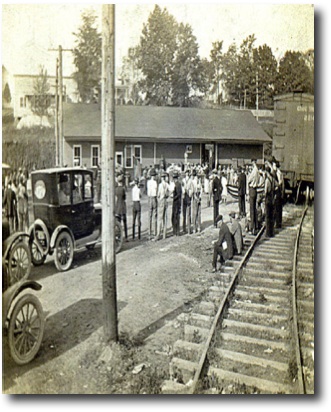The Railway Labor Act, the first significant piece of National Labor Legislation, was written in 1926, under the Coolidge Administration.
The Railway Labor Act Simplified
Purpose For Legislation
To avoid work stoppages that threaten to substantially interrupt interstate commerce to a degree such as to deprive any section of the country essential transportation services.
Railway Labor Act Enacted
Strike scenes like this played out throughout the country souring relations between the railroads and workers for quite some time.
Decades of railroad labor unrest which included widespread and often violent work stoppages frequently pitted federal soldiers against striking railroad workers. In 1924, President Calvin Coolidge urged both Railroads and Unions to recommend legislation for better labor/management relations and reduce the threat of railroad shutdowns. Railroads and their unions jointly drafted legislation, whose premise is that arms-length negotiations (jaw-jaw, not war-war) promote more stable labor relations. Formally signed by President Coolidge on May 20, 1926, this new law was designated the Railway Labor Act of 1926 (RLA).
The RLA was the first federal law guaranteeing the right of workers to organize and join unions and elect representatives without employer coercion or interference.
The RLA makes it the duty of all carriers and their employees to exert every reasonable effort to voluntarily settle disputes.
Who is covered by the RLA
The RLA applies to freight and commuter railroads, airlines, companies directly or indirectly controlled by carriers who perform services related to transportation of freight or passengers and the employees of these railroads, airlines and companies.
The RLA contains five basic purposes
To avoid any interruption to commerce.
To ensure an unhindered right of employees to join a labor union (added in 1934).
To provide complete independence of organization by both parties to carry out the purposes of the RLA.
To assist in the prompt and orderly settlement of disputes covering rates of
pay, work rules, or working conditions.
To assist in the prompt and orderly settlement of disputes growing out of
grievances or out of the interpretation or application of existing contracts covering the rates of pay, work rules or working conditions.
“Major”and “Minor”Disputes
Major Disputes–matters affecting rates of pay, rules and working conditions; and, making or modification of the collective bargaining agreement between the parties.
- Almost total reliance upon collective bargaining for dispute settlement.
- Self-help permitted after negotiation and mediation procedures are exhausted.
Minor Disputes–grievances growing out of the interpretation or application of collective bargaining agreements.
- National Railroad Adjustment Board (NRAB) or alternative boards of adjustment have exclusive jurisdiction over grievance disputes.
- Self-help not allowed

